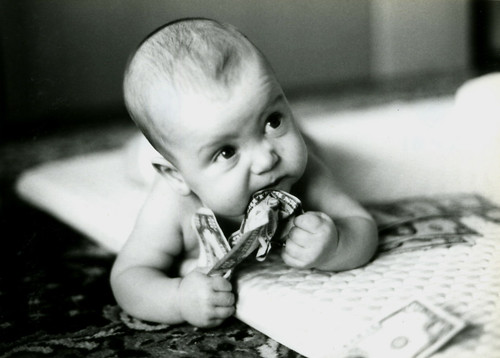- Watching Gamers:Dorkness Rising #
- Charisma? Weee! #
- Tweeting a dork movie? I'm a bit of a geek. #
- We just met and the first thing you do, after boinking a stranger in the presence of the king, is to murder a peasant? #
- Every movie needs a PvN interlude. #
- Everything's better with pirates. #
- Waffles? Recognize. #
- The Spatula of Purity shall scramble the eggs of your malfeasance. #
- Checkout clerks licking their fingers to separate bags or count change is gross. #
- Watching Sparkles the Vampire, Part 2: Bella's Moodswing. #twilight #
- @penfed was a waste of money. $20 down the drain to join, wouldn't give a worthwhile limit, so I can't transfer a balance. #
- @JAlanGrey It's pretty lame. The first one was ok. This one didn't improve on the original. in reply to JAlanGrey #
- RT @tferriss: Are you taking snake oil? Beautiful data visualization of scientific evidence for popular supplements: http://ping.fm/pqaDi #
- Don't need more shelves, more storage, more organization. Just need less stuff. #
- @BeatingBroke is hosting the Festival of Frugality #226 http://su.pr/80Osvn #
- RT @tferriss: Cool. RT @cjbruce link directly to a time in a YouTube video by adding #t 2m50s to end of the URL (change the time). #
- RT @tferriss: From learning shorthand to fast mental math – The Mentat Wiki: http://ping.fm/fFbhJ #
- RT @wisebread: How rich are you? Check out this list (It may shock you!!!) http://www.globalrichlist.com/ #
- RT @tferriss: RT @aysegul_c free alternative to RosettS: livemocha.com for classes, forvo.com for pronunc., lang8.com for writing correction #
- Childish isn't an insult. http://su.pr/ABUziY #
- Canceled the Dish tonight. #
Selling Your Home: The Real Estate Agent
If you are not able or willing to sell your home yourself, you’ll need to find a real estate agent. A realtor is someone who deals with all of the hassles involved in selling your home in exchange for a fee of up to 7% of the selling price.
The hassles include marketing, an objective price analysis, advertising on the internet and in newspapers, providing a yard sign, negotiating the sale price, reviewing and filling out the contracts, and navigating the entire process for you. The aren’t meaningless duties, so make sure you are getting what you pay for. You need to find the right realtor for you.
The key to to ask questions, particularly the right questions. You can ask the wrong ones if you’d like, but they tend not to help much.
Helpful questions include:
- “Can I call your previous clients?” If the answer is no, run away! If the answer is yes, get the list and call them.
- “Have you sold any homes near here recently?” Get the names and numbers of the customers and call them. Find out how it went and what they wish would have happened differently. If the realtor hasn’t sold nearby homes recently, keep looking.
- “Will you put your sales strategy in writing?” If it’s not in writing, you may be left paying the full commission, without getting the full promised service.
- “What will you tell a potential buyer that wants to negotiate?” Make sure you and your realtor are on the same page.
Now for some secrets that realtors will not volunteer.
- The selling fee is negotiable. If you live in a popular development, or if nearby homes have sold quickly, you should be able to get your fee reduced a couple of points.
- You don’t have to sign an exclusive listing agreement. With an exclusive agreement, you will pay the realtor a fee if the house sells. Period. With a non-exclusive agreement, you can list with several agents and only pay the one who actually sells your house. If you find the buyer, you won’t pay a selling commission at all.
Selling your house can be intimidating and realtors are there to make the task easier for you. Have you had any problems with real estate agents?
A Perfectly Maid Home
Last night, I got home after a 13 hour day at the office and found a spotlessly clean house. The laundry was folded. The dishes were done, and everything was put away.
It was great.
I work 80 hours a week, 90 if you count commuting time.
That’s about 50 hours at my day job, 10-15 hours working on this site, and 20-30 hours working on my other side hustles. Some weeks, my volunteer geek skills get put to use for a local non-profit, too.
My wife works at least 40 hours every week.
We chase our kids around, plan or birthday parties, visit family, take care of the yard, and do everything else that every other family does.
The difference is that, if I take work in all of its forms out of the equation and give myself permission to get a full night’s sleep every night, I have a total of 20-30 hours per week to eat, socialize, and spend time with my family. That not a lot.
I hate cleaning.
Between my work schedule and my cleaning aversion, I’m not always a lot of help around the house.
Half of my work time is spent at home. It’s hardly fair to expect my wife to clean up after me.
This has been a huge point of contention between us. She sees me on the computer and gets frustrated when I’m not helping her clean up. I get frustrated because I’m trying to make us some extra money, but she’s complaining that I’m not cleaning.
About a month ago, we hired a housekeeper. She comes every other week for a few hours and does a phenomenal job cleaning our house. We pay her about $150 per month for the work.
It’s been great.
My wife is happy because the house is clean. I’m happy because the complaining has stopped. Our housekeeper is happy because it’s more money. It’s a win/win/win scenario.
Now, $150 is a decent amount to add to our debt snowball, but paying for the cleaning services facilitates my side hustles, which bring in quite a bit more than $150 per month, so it’s even a good idea financially.
Even if it’s not, the peace of mind of knowing that I didn’t have to fold all of the laundry that was waiting for me yesterday makes it worthwhile.
How about you? Would you consider hiring a maid? Why?
Twitter Weekly Updates for 2010-07-10
- Happy Independence Day! Be thankful for what you've been given by those who have gone before! #
- Waiting for fireworks with the brats. Excitement is high. #
- @PhilVillarreal Amazing. I'm really Cringer. That makes me feel creepy. in reply to PhilVillarreal #
- Built a public life-maintenance calendar in GCal. https://liverealnow.net/y7ph #
- @ericabiz makes webinars fun! Even if her house didn't collapse in the middle of it. #
- BOFH + idiot = bad combination #
Babies Are Expensive
From the comments here. The discussion is on how much it costs to have a baby. Edited for clarity.
 Babies” width=”270″ height=”200″ />
Babies” width=”270″ height=”200″ />
Actual birthing costs vary. We’ve had three kids over ten years and birthing costs have varied from $250 out of pocket to $8500. Our highest and lowest price births were 20 months apart. The highest price birth involved induced labor with an epidural. For the lowest out-of-pocket price, I added my wife to my policy before the birth, so she was double-covered. If one of your policies is less than ideal and there are multiple policies available, I recommend doing this. It saved us thousands. All told, If things go well, you could slide for as little as $1500 total.
For the highest price birth, we threw ourselves on the mercy of the finance department. They have a charity fund to pay the bills of the less fortunate. We qualified…barely. If you have a medical bill you can’t afford, ask if there is a grant or donation you can apply for. Always ask if there is some way the bill could be lowered.
Breast-feeding beats the heck out of formula, financially, but breast-feeding doesn’t always work. Ignore the boob-nazis who insist you are slowly killing your kid by using formula. I’ve got 3 kids, and each had different feeding issues.
Baby formula runs $19 for a big container at Sam’s Club, or a large percentage of your soul at most other big box stores. Formula alone will pay for your membership in under a month. For a big eater, that’s $20-30 per week. For a normal eater, 2-3 weeks. For planning purposes, assume $100/month in formula costs for the first six months, when food starts coming into play heavily. After that, the formula expense goes down, but not away for at least 6 more months.
Diapers are painful. Not just the smell–though that hurts, too, sometimes–but the expense. I currently have 2 in diapers; one is potty-training. Our monthly costs for diapers, now, are about $75. It was easily twice that when they were younger. Figure at least $100 per month in diapers. Unless your baby has irritation problems, go with cheap diapers. Leak-guard is a joke. If you are relying on leak-guard to keep the contents inside the diaper, you aren’t changing your baby often enough.
I couldn’t begin to guess at how much you’ll spend on baby clothes. I have never bought clothes for our kids. Whatever didn’t come free from friends and family walked into the house of it’s own volition, following my wife home from the store.
Toys are an almost purely voluntary expense. You’ll get as much as the kids needs free, as presents. You’ll go overboard and give the kids 10 times that, without realizing it. Don’t. For the first four to five months, its fingers and toes will be entertaining enough. After that, if there are more than about ten toys, it’s too many; the kid will never get attached to any of them. Keep it small. It’s better for the kids and the budget. Little kids prefer boxes to toys, anyway. Give the kid a shoebox instead of a Leapfrog. Really.
Portraits suck, too. If you have to get them done professionally, get a membership that covers sitting fees, and use coupons. I recommend JC Penney’s. Using judicious coupons and the membership, we get portraits for under $20.
Baby food is probably cheaper to make in a food processor, but you can’t beat the convenience of the little jars. If you watch sales, you can stock up affordably. Mix every meal with some rice or oatmeal mush to stretch it, without making it unhealthy. Depending on your kids, and how much you listen to the “experts”, this is a nonexistent expense before six months. Our kids started eating baby food in their second months, at least a little bit.
Babies are expensive. Don’t doubt that for a second, but ignore the polled averages when it comes to expense. Hand-me-downs, thrift stores, and good sales cut the expense a lot.
How do you save money and value with a baby in the house?
What Is Your Binary Options Strategy?
 When you are just entering the world of binary options trading or investing, you may be on the receiving end of a lot of advice. It is not uncommon to hear people tell you to implement different gambling strategies because binary options are based on chance more than anything else. You will also hear a lot of advice from those who say there are many good ways to develop an effective strategy using indicators and market signals. Some will insist that with proper analysis of market data, a solid strategy can be developed too.
When you are just entering the world of binary options trading or investing, you may be on the receiving end of a lot of advice. It is not uncommon to hear people tell you to implement different gambling strategies because binary options are based on chance more than anything else. You will also hear a lot of advice from those who say there are many good ways to develop an effective strategy using indicators and market signals. Some will insist that with proper analysis of market data, a solid strategy can be developed too.
Are they all correct? Interestingly enough, the answer is yes. The reason for this is simple, and as one expert writes, “there is no such thing as a perfect strategy for every trader. There is only a best strategy for each individual trader.” Thus, your strategy has to be shaped around a few things:
- Your willingness and ability to follow your chosen strategy.
- Your personality. For instance, are you restless if you are taking the safe route or a higher risk strategy?
- Your budget and goals,
Identifying the answers to these questions is the first step to formulating a strategy. You should also understand that the winning percentage of most strategies will be somewhat constant, but the total number of successful trades varies on an individual basis and is based entirely on the strategies used.
For instance, some investors want a high percentage of winning trades and are more comfortable with risk averse trading. Others are ready to take more risk and are entirely comfortable winning fewer trades if the returns on winning trades are dramatically higher. This enables them to implement higher risk trades. The interesting thing about strategies and the kinds of trades they generate is that they are all built from the same data.
The Data of Strategy
For example, almost all strategies will look at issues like market trends, trading trends, highs and lows, reversals, and various kinds of indicators. The reason that high and low trends pay off in strategy development is simple: binary options trading applies to whether or not an asset rises above a strike price or doesn’t. It is the proverbial “yes or no” part of the proposition and analysis for either outcome pays off.
As an example, a lot of risk-averse investors will look for breakouts. They use these for trend line investing, which can be as brief as sixty seconds to a day, but can be used to coordinate investing in the direction of a short trend. Although this seems complex, it really is not. The key is that analysis cannot be broad and across all available markets. Instead, focused analysis on a specific area will allow even a novice investor to analyze for a breakout and then invest in binary options accordingly.
Just being able to detect a reversal or a downward trend over the course of a day can yield a very rewarding investment. The key is to understand your strategy based on your budget, personality, and your ability to stick with the strategy, even if it does not yield immediate success. When you do this, and use the right tools for analysis, you can create an effective strategy that brings you closer to your goals.
This is a guest post.

